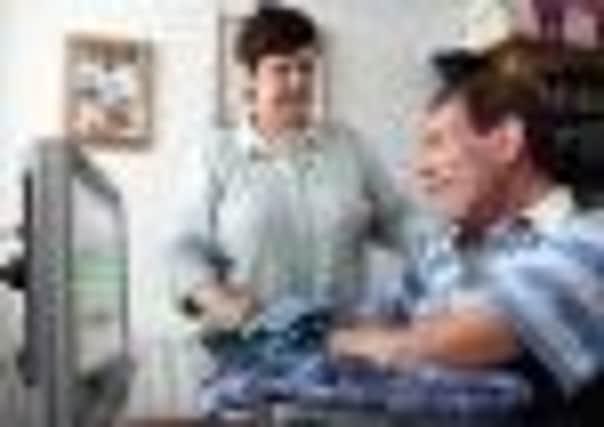‘I am condemned to a life of indignity and misery’ - Judges reject ‘deeply moving’ plea in right to die case


The 58-year-old sufferer of “locked-in syndrome” – who said he was robbed of his privacy and dignity after being left paralysed below the neck after a stroke seven years ago – vowed to appeal the ruling, which also saw another victim of the syndrome lose his challenge.
Three judges sitting in London referred to the “terrible predicament” of the two men and described their cases as “deeply moving and tragic”.
Advertisement
Hide AdAdvertisement
Hide AdHowever, they stressed it was for parliament, not the courts, to bring about legislative change.


After the emotive decision – which will have widespread repercussions for other people looking to change the legal ban on assisted dying – the father of two, who once travelled the world as a civil engineer, was visibly distraught.
He said he felt “saddened” that the law wanted to condemn him to “a life of increasing indignity and misery”.
His wife, Jane, described the ruling as “one-sided”.
The other man, a 47-year-old known only as Martin, expressed “anger and frustration” in the wake of the judgment, and accused the court of prolonging his “tortuous situation”.
While previous right-to-die hearings had centred on assisted suicide, Mr Nicklinson’s case went further. He wanted the courts to give permission for a doctor to administer lethal drugs as his incapacity is such he would be unable to take them himself, even if prepared and given to him by someone else.
As the law stands, if the medical professional was to kill him, it would amount to murder.
Mr Nicklinson, from Wiltshire, wanted a declaration that it would not be unlawful “on the grounds of necessity” for his GP, or another doctor, to assist him to die. Alternatively, he wanted a declaration that the current law on murder or assisted suicide was incompatible with his right to respect for his private life under Article 8 of the European Convention on Human Rights.
The court heard that Mr Nicklinson, who suffered a catastrophic stroke while on a business trip to Athens in 2005, had been told his existence of “pure torture” could continue for another 20 years or more.
Advertisement
Hide AdAdvertisement
Hide AdBut Lord Justice Toulson, Mr Justice Royce and Mrs Justice Macur unanimously agreed that it would be wrong for the court to depart from the long-established legal position that “voluntary euthanasia is murder, however understandable the motives may be”, which means that doctors and solicitors who encourage or assist another person to commit suicide are “at real risk of prosecution”.
Refusing the stricken men judicial review, the judges ruled that the law did not breach human rights and that any changes would require “the most carefully structured safeguards which only parliament can deliver”.
Mr Nicklinson said in a statement issued by his lawyers, Bindmans LLP: “I am devastated by the court’s decision. I thought that if the court saw me as I am, utterly miserable with my life, powerless to do anything about it because of my disability, then the judges would accept my reasoning that I do not want to carry on and should be able to have a dignified death.”
He added: “I am saddened that the law wants to condemn me to a life of increasing indignity and misery.”
Mr Nicklinson said he had instructed his legal team to “go all the way” and launch an appeal, adding: “Judges, like
politicians, are happiest when they can avoid confronting
the real issues, and this judgment is not an exception to this rule.”
Standing by her weeping husband’s side, his wife said they were “disappointed” by the “one-sided” decision. “You can see from Tony’s reaction he’s absolutely heartbroken. We
always knew it was a big ask, but we always hoped that the judges would see sense. But clearly they haven’t.”
Advertisement
Hide AdAdvertisement
Hide AdAsked what would happen if the appeal fails, she said: “Tony either has to carry on like this until he dies from natural causes or by starving himself.”
The other man, Martin, who has been left unable to speak and virtually unable to move after suffering a stroke in 2008, was primarily seeking a court order forcing the Director of Public Prosecutions to clarify his published policy.
Such a move would mean that professional people who might be willing to assist his suicide through the use of Dignitas, the Swiss group that specialises in assisted dying, would know whether they would be “more likely than not” to face prosecution in England.
In a statement released by his lawyer, he said: “I feel even more angry and frustrated now, having had this court tell me that I cannot receive professional help to take control of how I might end my own life.”
Dr Antony Lempert, a GP and chairman of the Secular Medical Forum, said: “This sad verdict leaves Tony Nicklinson with a terrible choice. Because other people regard his tortured life as somehow sacred, or are fearful of societal consequences, he is forced to endure his suffering or take desperate measures to end it.